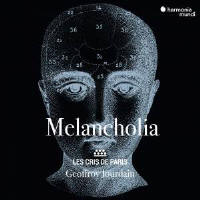Texte paru dans: / Appeared in:
Harmonia Mundi |
|
|
Outil de traduction ~ (Très approximatif) |
|
|
Reviewer: James
V. Maiello With 10 discs to their name, Les Cris de Paris and Geoffroy Jourdain have established themselves as important voices in early music, though the ensemble has done excellent work in new music as well. The ensemble is flexible and lithe, well suited to the sinuous lines of the repertoire on this, their latest, release. An instrumental performance of Byrd’s Lullaby, my sweet little baby serves as a kind of refrain amid madrigals and motets by luminaries like Gesualdo and Weelkes, as well as works by lesser-known figures such as Tudino and Wilbye. Wilbye’s Draw on, Sweet Night opens the program, an invitation into the musical world of the 17th century, a world in which emotion and text expression were taken to new heights. Instrumental readings provide timbral contrast throughout, and Gesualdo’s motet O vos omnes is a highlight of the first half of the disc. The choir offers a vigorous, deliberate performance, leaning into Gesualdo’s thorny clusters. Although the fast passagework lacks definition occasionally, the overall textures are iridescent, especially through cascading dissonances and at significant cadences. The program moves seamlessly between motet and madrigal, between English and Italian composers. This serves to highlight the profound influence Italian music had on English style, and the extent to which insular composers adapted Italian gestures and other elements to arrive at an idiosyncratically mournful sound all their own (e.g., placing Gibbons’s What is our Life? next to Marenzio’s Crudele acerba inesorabil’ morte). Careful programming also reveals the porous musical boundary between sacred and secular styles. Although the choir sings with restraint in motets like Gesualdo’s Tristis est anima mea, it allows the harmonic language of the madrigal to speak for itself. This is but one of many informed and perceptive interpretive decisions by Jourdain and the ensemble. Their default approach is one of confident refinement, but they deploy a more robust edginess strategically and sparingly to the harshest dissonances, giving the music a satisfying bite. If the program began with an invitation, it closes with a sort of melancholic nunc dimittis in the form of Weelkes’s O Care, thou wilt dispatch me. This recording is attractive for a variety of reasons. The program is cohesive from start to finish, with a logical progression of works and engaging contrasts, and with repeated touchstones. The performances are finely wrought, the singers navigating complex polyphonic webs with the kind of sprezzatura that the original audiences of these works would have appreciated. Moreover, the disc is a pleasure to listen to as an album, from start to finish. In a world of Spotify playlists and disjunct programming, this is a particular joy, like attending a well-conceived, beautifully executed concert performance. | |
|
|
|
|
Cliquez l'un ou l'autre
bouton pour découvrir bien d'autres critiques de CD |
|




